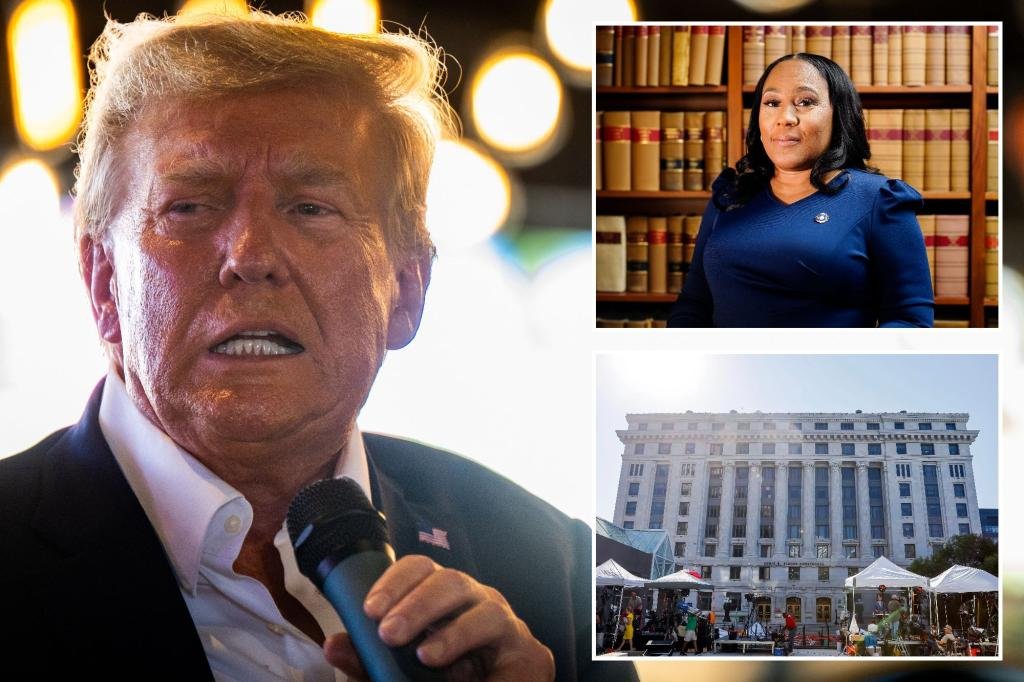Out of all indictments, Georgia is the most perilous threat to Trump
Another week, another indictment of Donald Trump.
In Georgia, Fulton County district attorney Fani Willis reportedly is putting the finishing touches on her grand jury, in preparation of an ambitious indictment of the former president and perhaps over a dozen of his 2020 campaign advisers and operatives.
The imminent charges relate to Trump’s efforts to undo the Peach State’s popular election, which was narrowly won by now-President Joe Biden.
Like Manhattan District Attorney Alvin Bragg, Willis is an elected Democrat.
In Atlanta as in the Big Apple, employing the criminal justice system against the Democrats’ arch nemesis makes for good progressive politics, even if it may be dodgy law.
That is not to say that Willis’s case will necessarily prove as dodgy as Bragg’s appears to be.

In the Soviet tradition of Lavrentiy Beria, Bragg started out with a man he was targeting then scoured the penal statutes to find a crime to pin on him.
The result is an embarrassing effort to convert a bookkeeping irregularity that harmed no one and that may not even have been a misdemeanor into 34 felony counts of falsifying business records.

In theory, Trump could be sentenced to over a century’s imprisonment — in a case brought by a paradigm progressive prosecutor whose default position is to refrain from prosecuting more serious crimes that plague New Yorkers.
Willis, by contrast, is probing serious misconduct — the duplicitous and heavy-handed schemes by which Trump tried to remain in power despite losing the election.
She can plausibly maintain that she is investigating Trump based on what he did, not who he is.
The question is whether what he did amounts to criminal offenses.
In this, she is running into the same complications that Biden Justice Department special counsel Jack Smith faces in the election-interference charges he has brought against Trump in Washington, D.C., federal court.
In fact, there is significant overlap in that case and Willis’s — the federal case includes the Georgia shenanigans but is broader because Trump’s schemes went beyond Georgia (seeking to reverse election results in additional battle-ground states won by Biden).
Smith’s problem is that the federal penal statutes he has invoked — relating to fraud, obstruction, and civil rights — do not clearly and narrowly target the kind of conduct in which Trump engaged.
The special counsel will have to stretch the law and get favorable court rulings to make the charges stick. I am not convinced that he can (or at least that he should) prevail, but it’s a serious case.
By contrast, Willis could have smoother sailing.

That’s because the federalist system designed by our Constitution gives the states primary responsibility to conduct and police elections.
Ergo, the states have laws that are tailored specifically to election irregularities and attempts to subvert state processes for tabulating and certifying votes.
Unlike Smith, Willis can invoke laws that are specifically designed to deal with election-interference conduct of the kind Trump engaged in.
That is not to say she won’t make some heads turn. Particularly if, as expected, she indicts Trump under Georgia’s anti-racketeering law.

We usually hear about racketeering in the federal context, where the RICO statute is used to prosecute organized crime groups.
But the basic idea behind anti-racketeering is to group a set of disparate criminal schemes under one conspiratorial arrangement.
Thus could Willis depict Trump and his campaign as the overarching racketeering enterprise, and allege that this group engaged in a variety of schemes all aimed at corruptly reversing the election outcome — from Trump’s efforts to pressure secretary of state Brad Raffensperger to invalidate ballots cast for Biden, to the so-called “fake electors” plot to substitute a slate of Trump electors for the slate of electors that cast the state’s electoral votes for Biden, consistent with the popular election result.
It sounds like ambitious charging, but it may not be all that much of a reach.
To be sure, Willis’s election case may not be as cut-and-dried as Smith’s Mar-a-Lago documents indictment.

I still regard the latter as the most perilous case for Trump: It involves an easily provable retention of national-defense intelligence, and it occurred after the election so there are fewer constitutional ramifications.
But Willis’s case may well be more straightforward — less legally problematic — than Smith’s election-interference case, and it will surely be more compelling than Bragg’s nakedly partisan business-records indictment.
What should most concern Trump is that the Georgia case could be the most enduring of all the criminal indictments.
If Trump or another Republican were to win the 2024 election, the new president could issue a pardon or otherwise have his Justice Department drop Smith’s federal indictments against Trump.
Indeed, that is why Smith is pushing so hard to get the federal courts in Washington and Florida to accelerate the schedule and get the cases to trial in the next few months — before Election Day 2024.
Presidents, however, have no authority to pardon state crimes.
It remains to be seen whether Wills can convince a jury of Atlantans to convict Trump. But even a newly elected President Trump could not make the Georgia prosecution go away.
If he were convicted, it would stick.
Andrew C. McCarthy is a former federal prosecutor.




